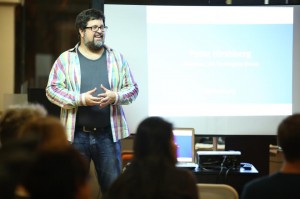This week has been an interesting one indeed. It seems the old adage about big ideas bubbling up through the collective conscious is dead on. In searching the blogosphere for Web 2.1 mentions I have come across dozens of postings added within the past week all on the same theme – what is web 2.0? Why is it different for everyone? Shouldn’t it really be web 3.0? and similar items.
Some good ones come from Ken Yarnosh @ Technosight, Andrew Watson @ Changing Way, HyKu, Richard McManus @ Read/Write Web, Susan Mernit agrees about people at the center and Dion Hinchcliffe are just a few…
Most notable for the purpose of the Web 2.1 discussion is John Hagel’s post on this subject which closes with the following:
While the Web 2.0 definition I propose may lead some people to focus attention on the technologies required to build this emergent platform, I agree with Tim OÂ’Reilly that it is more helpful to describe it as a mindset. Technologies alone can only do so much – they are ultimately only enablers. The real power is in the mindset that will be required to re-shape economic, social and legal frameworks to exploit the full potential of the technology.
I hope that these economic, social and legal issues get as much, if not more, attention in the forthcoming Web 2.0 conference organized by Tim and others.
While my thinking around Web 2.1 and the accompanying BrainJam next week is still a bit clouded, it is coming into focus each day – I think John makes the point of our discussion clear for us. What are the socio-economic changes that are really happening here, and more importantly from my perspective where do we want them to go?
Perhaps my original post on taking back the revolution was overly influenced by my time at Webzine2005 this past weekend, but I do believe the real trend/concept of Web 2.0 is empowering people with easy to use tools. In essence, this is the same idea that John Hagle proposes in his definition
Web 2.0 ultimately refers to “an emerging network-centric platform to support distributed, collaborative and cumulative creation by its users.”
Once again I see a lot of technologists being influenced by the cool factor of the technology instead of deepening their understanding of people and how they might us the tools. There is nothing wrong with being enamored of new technology (I certainly am), but I think the world could be better if we just take a moment to breathe it all in and ensure the focus is on real people first and then the technology. In the last month I have seen dozens of Web 2.0 sites without plans for how to operate as an ongoing concern. While the iterative process and the release early and often mantra takes the users into account more than ever before, many developers are still thinking of the people who will use the tools as users instead of people.
A new level of trust and understanding needs to be cultivated between people with different skills, backgrounds and perspectives. Technologist/developers and marketing/business people need each other – together they form a whole brain which can have much more of an impact than either could alone. The ability for teams and organizations to collaborate will be the key factor in determining success. To this end, we all know that diversity yields better results for the projects we undertake, let’s bake this idea into the foundation of Web 2.1.
If you are interested in talking more about these sorts of things and have not yet expressed this interest to me or through the BrainJams Wiki, please do so in the next 28 hours or so. No matter what the response, next FRI October 7, we will be getting together to talk about this and other related issues in San Francisco – but I need to know if we will just be doing it here at my house or if we need a bigger place to handle the group.
Tech Tags: web+2.0 web2.0 web2.1 web2point1 web+2.1 citizen+media brainjam brainjams blogoposium1
